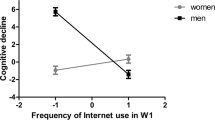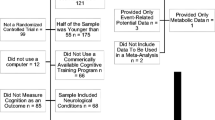Abstract
Background and aims: According to the concepts of ‘use it or lose it’ and cognitive reserve, cognitively challenging activities may boost cognitive abilities in older adults. Using computers and the internet provides divergent cognitive challenges to older persons, and the positive effects of computers and internet use on the qualify of life have been found in earlier studies. Methods: We investigated whether prolonged guided computer use by healthy older adults (64–75) may be beneficial to cognitive ability in a randomized controlled study. The intervention consisted of brief training and subsequent use of a personal computer with an internet connection at home for a 12-month period. 191 participants were randomly assigned to three groups: Intervention, Training/No intervention, or No training/No intervention. A fourth group consisted of 45 participants with no interest in computer use. The effect of the intervention was assessed by a range of well-established cognitive instruments that probed verbal memory, information processing speed, and cognitive flexibility. Data were collected at baseline and after four and twelve months. Results: Intensive interaction with a personal computer with standard software applications had no effect on cognitive measures; no differences in changes in cognitive parameters over time were found between groups. Conclusion: Learning to use a computer and the internet does not benefit healthy, community-dwelling older adults with respect to many domains of cognitive functions. The implications of these findings for future studies that use cognitive challenge to counteract usual cognitive aging are discussed.
Similar content being viewed by others
References
Craik FIM, Salthouse TA. The handbook of aging and cognition, 2nd ed. Mahwah, NJ: Erlbaum: 2000.
Schaie KW. The course of adult intellectual development. Am Psychol 1994; 49: 304–13.
Hultsch DF, Herzog C, Small BJ et al. Use it or lose it: Engaged lifestyle as a buffer of cognitive decline in aging? Psychol Aging 1999; 14: 245–63.
Wilson RS, Mendes de Leon CF, Barnes LL et al. Participation in cognitively stimulating activities and risk of incident Alzheimer disease. JAMA 2002; 287: 742–8.
Verghese J, Lipton RB, Katz MJ et al. Leisure activities and the risk of dementia in the elderly. N Engl J Med 2003; 348: 2508–16.
Bosma H, van Boxtel MP, Ponds RW et al. Engaged lifestyle and cognitive function in middle and old-aged, non-demented persons: a reciprocal association? Z Gerontol Geriatr 2002; 35: 575–81.
Christensen H, Korten A, Jorm AF et al. Activity levels and cognitive functioning in an elderly community sample. Age Ageing 1996; 25: 72–80.
Swaab DF. Brain aging and Alzheimer’s disease, “wear and tear” versus “use it or lose it”. Neurobiol Aging 1991; 12: 317–24.
Frick KM, Fernandez SM. Enrichment enhances spatial memory and increases synaptophys in levels in aged female mice. Neurobiol Aging 2003; 24: 615–26.
Milgram NW. Cognitive experience and its effect on age-dependent cognitive decline in beagle dogs. Neurochem Res 2003; 28: 1677–82.
Stern Y. What is cognitive reserve? Theory and research application of the reserve concept. JINS 2002; 8: 448–60.
Stigsdotter A, Backman L. Effects of multifactorial memory training in old age: Generalizability across tasks and individuals. J Gerontol Psychol Sci 1995; 50B: P134–40.
Valentijn SAM, van Hooren SAH, Bosma H et al. The effect of two types of memory training on subjective and objective memory performance in healthy individuals aged 55 years and older: a randomized controlled trial. Patient Educ Couns 2005; 57: 106–14.
Verhaeghen P, Marcoen A, Goossens L. Improving memory performance in the aged through mnemonic training: a meta-analytic study. Psychol Aging 1992; 7: 242–51.
Ball K, Berch DB, Helmers KF et al. Effects of cognitive training interventions with older adults: a randomized controlled trial. JAMA 2002; 288: 2271–81.
Schaie KW, Willis SL. Can decline in adult intellectual functioning be reversed? Dev Psychobiol 1986; 22: 223–32.
Cody MJ, Dunn D, Hoppin S et al. Silver surfers: training and evaluating internet use among older adult learners. Communication Education 1999; 48: 269–86.
White H, McConnell E, Clipp E et al. A randomized controlled trial of the psychosocial impact of providing internet training and access to older adults. Aging Ment Health 2002; 6: 213–21.
Strenge AJ, Walker N, Rogers WA. Searching the World Wide Web: can older adults get what they need? In Rogers WA, Fisk AD, eds. Human Factors Interventions for the Health Care of Older Adults. Mahwah, NJ: Erlbaum, 2001: pp. 255–69.
Lin D-YM. Hypertext for the aged: effects of text topologies. Comput Human Behav 2003; 19: 201–9.
McConatha D, McConatha JT, Dermigny R. The use of computer services to enhance the quality of life for long term care residents. Gerontologist 1994; 34: 553–6.
McConatha JT, McConatha D, Deaner SL et al. A computer-based intervention for the education and therapy of institutionalized older adults. Educ Gerontol 1995; 21: 129–38.
Folstein MF, Folstein SE, McHugh PR. Mini-Mental State: a practical method for grading the cognitive state of patients for the clinician. J Psychiatr Res 1975; 12: 189–98.
Buchner A, Faul F, Erdfelder E. GPOWER: A priori-post hoc- and compromise power analyses for the Macintosh. In. 2.1 end., Series GPOWER: A priori-post hoc- and compromise power analyses for the Macintosh. Bonn, Germany: Bonn University, 1992.
Jolles J, Houx PJ, van Boxtel MPJ et al, ed. Maastricht Aging Study: Determinants of cognitive aging Maastricht: Neuropsych Publishers, 1995.
Moller JT, Cluitmans P, Rasmussen LS et al. Long-term postoperative cognitive dysfunction in the elderly ISPOCD1 study. IS-POCD investigators, International Study of Post-Operative Cognitive Dysfunction. Lancet 1998; 351: 847–61.
van der Elst W, van Boxtel MPJ, van Breukelen GPJ et al. Rey’s verbal learning test: Normative data for 1855 healthy participants aged 24–81 years and the influence of sex, education, and model of presentation. J Int Neuropsychol Soc 2005; 11: 290–302.
Houx PJ, Jolles J. Age-related decline of psychomotor speed: effects of age, brain health, sex and education. Percept Mot Skills 1993; 76: 195–211.
Kornblum S, Hasbroucq T, Osman A. Dimensional overlap: cognitive basis for stimulus-response compatibility — a model and taxonomy. Psychol Rev 1990; 97: 253–70.
van der Elst W, van Boxtel MPJ, van Breukelen GPJ et al. The Letter Digit Substitution Test: normative data for 1858 healthy participants aged 24–81 from the Maastricht Aging Study (MAAS): Influence of age, education and sex. J Clin Exp Neuropsychol 2006; 28: 998–1009.
Lezak MD. Neuropsychological assessment, 3rd ed. New York: Oxford University Press, 1995.
Vink M, Jolles J. A new version of the Trail-Making Test as an information processing task. J Clin Neuropsychol 1985; 7: 162.
Houx PJ, Jolles J, Vreeling FW. Stroop interference: aging effects assessed with the Stroop Color-Word Test. Exp Aging Res 1993; 19: 316–23.
Broadbent DE, Cooper PF, FitzGerald P et al. The Cognitive Failure Questionnaire (CFQ) and its correlates. British J Clin Psychol 1982; 21: 1–16.
Merckelbach H, Muris P, Nijman H et al. Self-reported cognitive failures and neurotic symptomatology. Pers Individ Diff 1996; 20: 715–24.
Kliegl R, Smith J, Baltes PB. Testing-the-limits and the study of adult age differences in cognitive plasticity of a mnemonic skill. Dev Psychol 1989; 25: 247–56.
Brooks JO, Friedman L, Pearman AM et al. Mnemonic training in older adults: effects of age, length of training, and type of cognitive pretraining. Int Psychogeriatr 1999; 11: 75–84.
Danowski JA, Sacks W. Computer communication and the elderly. Exp Aging Res 1980; 6: 125–35.
Sherer M. The impact of using personal computers on the lives of nursing home residents. Phys Occup Ther Geriatr 1996; 14: 13–31.
Czaja SJ, Sharit J. The influence of age and experience on the performance of a data entry task. In: Human Factors and Ergonomics Society (HFES) 41st Annual Meeting. Vol. 1. The influence of age and experience on the performance of a data entry task. Albuquerque: HFES, 1997: pp. 144–7.
Author information
Authors and Affiliations
Corresponding author
Rights and permissions
About this article
Cite this article
Slegers, K., van Boxtel, M. & Jolles, J. Effects of computer training and internet usage on cognitive abilities in older adults: a randomized controlled study. Aging Clin Exp Res 21, 43–54 (2009). https://doi.org/10.1007/BF03324898
Received:
Accepted:
Published:
Issue Date:
DOI: https://doi.org/10.1007/BF03324898




